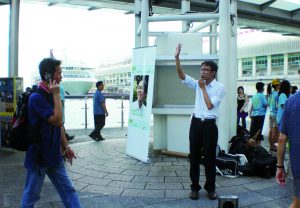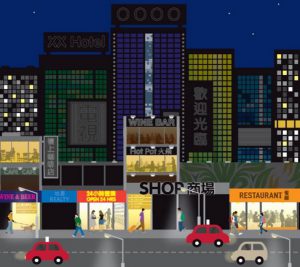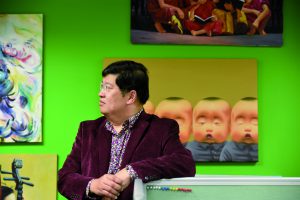Green politicians struggle to put environmental issues at the top of the public agenda
by Verena Tse & Minnie Wong
In an open space outside the Star Ferry Terminal in Tsim Sha Tsui, a young man stands holding a microphone, a loudspeaker at his feet. Behind him a roll-up banner bears the slogan: “Vote for a Green Hong Kong”. Around a dozen other young people around him wear T-shirts printed with the same slogan. Some of them hand out leaflets to passers-by and others hold up boxes with “Leaflet Recycle Box” written on them.
This is a flashback to 2008, when the then 28-year-old Roy Tam Hoi-pong was campaigning for election to the Kowloon West Constituency in the Legislative Council as an independent candidate.

Tam has been interested in environmental protection since he was a student at the Chinese University of Hong Kong where he studied Environmental Science. He joined green student groups and published a student magazine to promote environmental awareness on campus. In 2004, he founded Green Sense, a watchdog non-governmental organisation (NGO) aiming to monitor environmentally unfriendly policies.
Looking back, Tam says he was just a “pure environmentalist” at the time, who could steer clear of politics. But the more he confronted district councillors on district affairs, the more he realised politicians had the power to push green policies and to reject non-environmentally friendly ones.
“It struck me then that instead of being the one protesting and handing over petitions, why not be the district councillor instead?”
Tam decided to contest the 2008 Legislative Council election as an environmentalist but lost resoundingly. He thinks this was down to his being a complete unknown back then, and because he was campaigning on a single issue –environmental protection.
While he continued to address green issues, Tam also started taking part in other social movements and campaigns with a localist slant, such as demanding restrictions on the Individual Visit Scheme for mainland visitors. In 2014, he joined the Neo Democrats, a breakaway party founded by former Democratic Party members who stressed localist values. Last year, Tam ran in the district council elections as a Neo Democrat candidate and won a seat in Ma Wan in the Tsuen Wan district.
The experience has taught Tam that a combination of green advocacy and localist values is a better platform for winning votes than a purely environmental
one. However, while being a member of a political party means Tam may be more effective in council meetings, the flip side is he has to concern himself with voters who care about more than just the environment. As a party member, Tam says he cannot go as far on environmental issues as he could as the founder of a green group.
His influence as a district councillor is also limited by the limitations of the district councils, which are only advisory bodies without financial autonomy and policy making powers.
However, there are some advantages to being a councillor. Tam has only been in office for a few months but he already receives greater attention from the government. Various government departments will reply to him more quickly when he submits questions, and their attitude towards him is more respectful than it was when he was just an environmentalist.
Tam will not be drawn on any plans to stand in the Legislative Council elections in September but he believes legislators can play an important role in pushing a green agenda.
“Of course the Legislature cannot do work as down-to-earth as the district council,” he explains, “but at least it can stop detrimental projects through means like filibustering.”
But sitting legislator Cyd Ho Sau-lan is more sanguine about the extent to which lawmakers can influence the government. She is an active member of the Panel on Environmental Affairs and has chaired many of the panel’s subcommittees, such as the Subcommittee on Issues Relating to Air, Noise and Light Pollution.

In January, Secretary for the Environment Wong Kam-sing launched the first- ever Charter on External Lighting to reduce light pollution. But Ho is disappointed to have a voluntary charter rather than binding legislation.
She says the subcommittee spent seven years deliberating over the problem of light pollution – a problem that affects not only the environment, but also the well-being of local residents. Yet up till now there are no laws to restrict the size of billboards that block views and cause ventilation problems.
Ho says it is difficult to pass environmental policies because legislators cannot propose private member’s bills. This is because Article 74 of the Basic Law prohibits them from introducing bills that would affect public expenses, the existing political structure or government operations, unless the Chief Executive provides written consent. Proposals to deal with environmental problems often involve public expenses, which make them a non-starter.
Even if a lawmaker did manage to propose a private member’s bill, the split voting system means the bill would have to garner a majority of votes from both geographical constituency members and functional constituency members in order to pass. In contrast, a government bill just needs a simple majority to pass.
Because of these systemic limits, district and legislative councillors like Roy Tam and Cyd Ho struggle to advance environmental causes through the established political platforms.
But Paul Zimmerman, who has been district councillor for Pokfulam since 2010, thinks another reason it is hard to make progress in environmental protection in Hong Kong is because the government also finds it hard to make changes.
Zimmerman, who has lived in Hong Kong since 1984, says the city has always been very slow in adjusting its policies to its circumstances.
“The problem is that since 1982, Hong Kong, as a city, has been very busy with something that no other cities have – to negotiate the future of being with England or with China,” he explains.
Zimmerman says that even now, more than 18 years after the 1997 handover, the government constantly has to deal with the city’s relationship with the Mainland.
“This has taken up so much time of senior management that they are not helping departments with changes that need to be done.”
The government has tried to show it is serious about promoting green development. Instead of appointing career civil servants like Edward Yau Tang-wah to head the Environment Bureau, the Leung Chun-ying government has appointed specialists and professionals known for being active on green issues, like Wong Kam-sing and Christine Loh Kung-wai to the top environmental jobs in the administration.
But the result has been a “real disappointment” for Zimmerman. He says the government still cannot resolve the conflict between environmental protection and development, and he sees little effort being made to do so.
He points out that the government is still working with voluntary green building guidelines instead of mandatory ones to control residential and commercial energy consumption.
“Clearly, KS [Wong Kam-sing] and Christine have not been able to achieve a lot in that sense,” he says. “Property developers and landowners are definitely still ruling the town.”
In many countries, environmentalists and politicians form political groups that clearly advocate for green policies and stand in elections on green platforms. Green parties are a regular fixture in many European nations and in North America, Australia and New Zealand. Germany’s Green Party has had members of parliament since 1983 and parties in Europe have ruled in coalition governments at both national and state levels. Not as successful at such a high level but closer to home, Taiwan’s Green Party won two seats in the 2014 local elections.

Hong Kong does have a Green Party. Founded by Albert Oung in 2009, it aims to promote sustainable economic growth. In 2012, a party member contested the district council election for the Kwai Fong constituency but lost. Oung says this was probably because citizens were not familiar with the party’s manifesto.
He says the party will not participate in any upcoming elections, as it wants to put more effort into educating members on the core values of the party instead. Although it describes itself as a “political party” on its website, the group does not appear to be functioning as one at the moment.
According to Chu Hoi-dik, a Local Action activist and founder of the Land Justice League, Hong Kong is not ready to develop a political green party. Chu, who has twice stood and lost in district council elections in rural Yuen Long, says most people generally think of green issues as being related to the allocation of resources and profits. As a result, politicians will use the idea of “green” or pay lip-service to green issues to win supporters rather than genuinely act upon environmentally friendly ideas.
Meanwhile, says Chu, the government is reluctant to introduce fundamental changes in society that would improve the environment. Reducing consumption and development is essential in the long-term but this would inevitably reduce production and affect the economy, a situation the government fears.

There is another reason why Chu thinks Hong Kong does not have an independent, green political party and that is because green groups have been too depoliticised in the past.
“They just did trivial things, such as collecting mooncake containers,” he says. “They didn’t dare to launch social movements, so they can’t mobilise the public and create pressur
e that would give them the bargaining power to influence the government.”
Chu says he has considered making the Land Justice League an official political party, but he has reservations because of the lack of genuine universal suffrage in Hong Kong. He notes that the green parties in the West were formed only after they had become democratic countries. Hong Kong, however, is still in the middle of attaining democracy. Chu says he understands it is natural that all the support and resources in society would go to political parties fighting for a democratic cause.
Nevertheless, he thinks it would be worthwhile to have a green party in Hong Kong.
“Because after all, the environment is an even more fundamental and pressing issue than constitutional reform.”
Edited by Teenie Ho










































